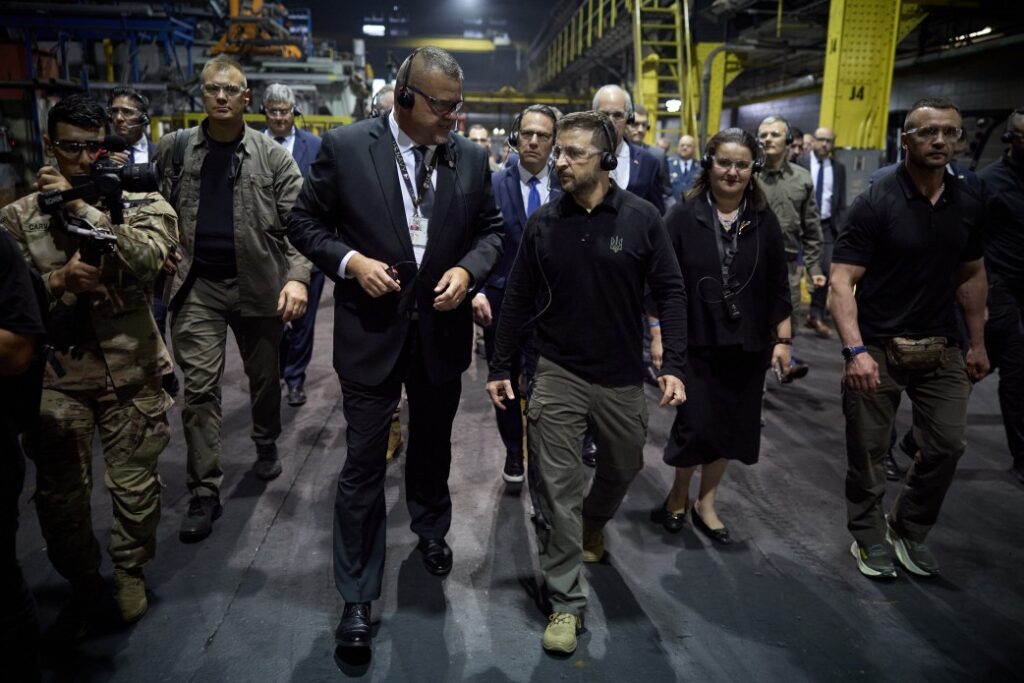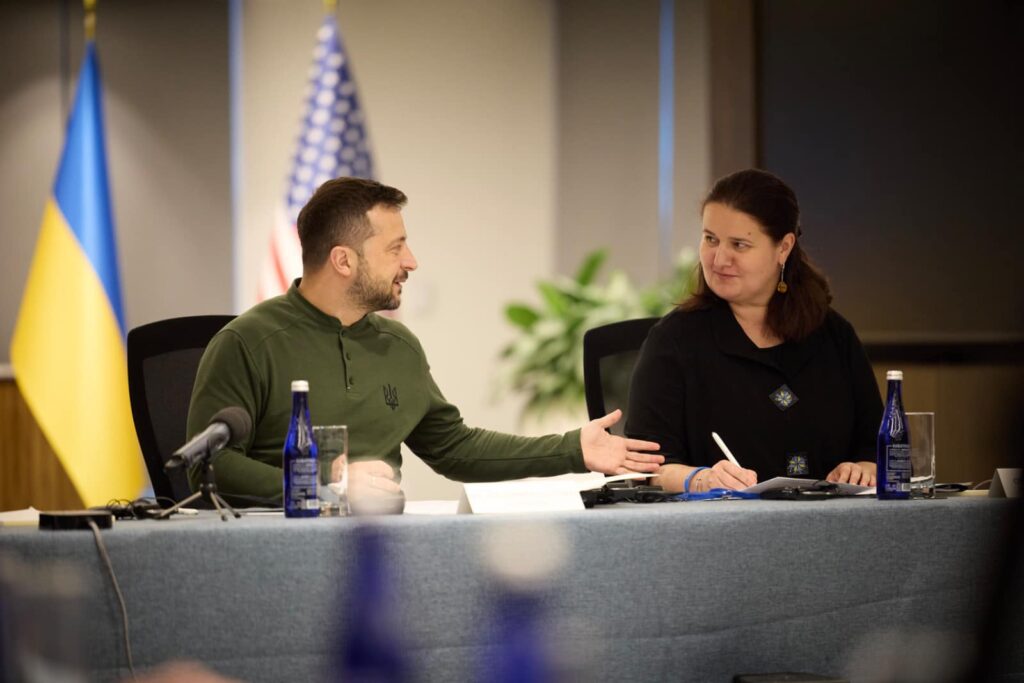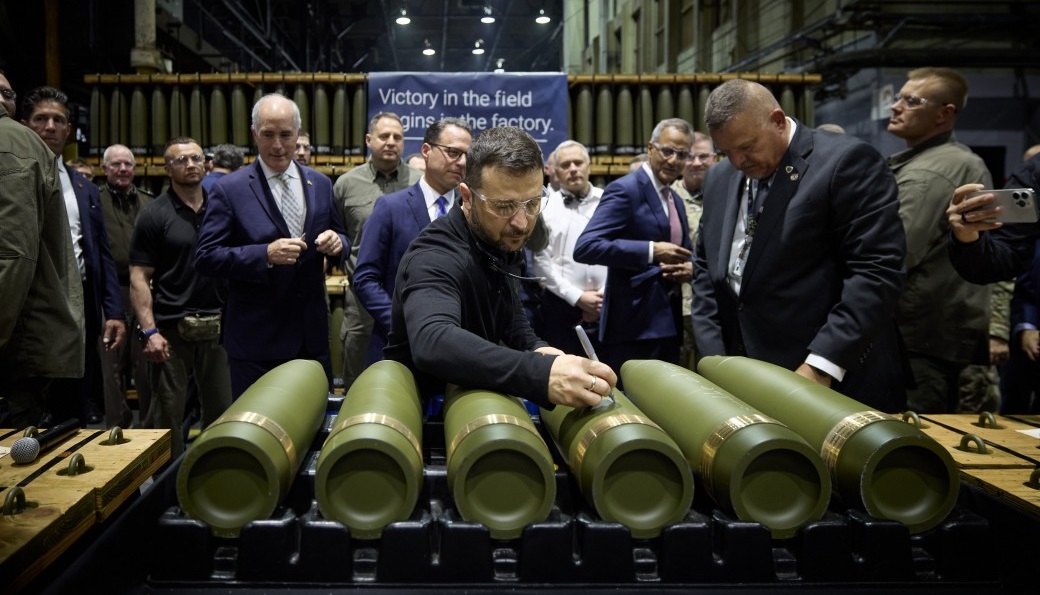A major political scandal has erupted surrounding Ukrainian President Volodymyr Zelenskyy's recent visit to the United States, threatening to undermine crucial support for Ukraine. The controversy centers on Zelenskyy's tour of an ammunition factory in Pennsylvania, a key swing state in the upcoming US presidential election.
In a shocking turn of events, House Speaker Mike Johnson publicly accused Zelenskyy of attempting to interfere in the American election. Johnson's open letter condemned the visit, noting that only Democratic politicians accompanied Zelenskyy to the factory. The Republican leader went so far as to demand the dismissal of Ukraine's Ambassador to the US, Oksana Markarova, alleging her role in orchestrating the contentious visit.
Adding fuel to the fire, former President Donald Trump, who had previously expressed interest in meeting Zelenskyy, dramatically reversed his stance. Trump abruptly canceled all planned meetings and launched a series of scathing remarks against the Ukrainian leader. Most notably, Trump labeled Zelenskyy "the greatest salesman in history," insinuating that each of his visits to the US results in billions of dollars in aid.
This scandal has sent shockwaves through diplomatic circles, raising serious questions about the future of US-Ukraine relations and the stability of international support for Ukraine. To analyze the fallout and potential consequences, Euromaidan Press turned to Oleksandr Kraiev, Director of the North America Program at the Foreign Policy Council "Ukrainian Prism."
Why the ammo plant in Pennsylvania?
The controversial visit to a Pennsylvania ammunition factory during Zelenskyy's US trip has sparked debate. Several theories attempt to explain this decision:
- Ukrainian oversight: Ukraine may have underestimated the political implications.
"Visiting a swing state, Biden's hometown, right after confirming a meeting with Trump is problematic. This visit appears to favor Biden," Oleksandr Kraiev explains.
- US administration influence: Some speculate that Biden's team pressured Zelenskyy. However, Kraiev dismisses this.
"In diplomatic circles, it's unheard of for a host delegation to insist, 'We're going to Pennsylvania, period. Don't like it? Too bad, we're going anyway.' That's not how it works," says the expert.
- Political strategy: A theory suggests Harris's team orchestrated this to force Zelenskyy to show political preference. Kraiev considers this highly unlikely.
"Putting an ally in such a compromising situation would irreparably damage relations, regardless of who becomes president. Administrations change, but such actions are not forgotten and can provoke future conflicts," he says.
Given the high-profile nature of the visit and the extensive security measures required, it's clear this event was planned well in advance. This timeline suggests both Kyiv and Washington had ample opportunity to weigh the potential implications. Surely, Ambassador Markarova would have been cognizant of the possible fallout.
Yet, despite the risks, Zelenskyy went ahead with the visit. This decision hints that declining may not have been viable for the Ukrainian president. As a result, the true motivations behind selecting this particular location in Pennsylvania remain shrouded in uncertainty.

The diplomatic mystery
Another puzzling aspect of this situation is the sudden shift in rhetoric from both Trump and the White House in recent days.
Initially, Trump's camp supported meeting Zelenskyy and viewed Ukraine's Victory plan positively. House Speaker Johnson was preparing a bipartisan delegation for the meeting, while the White House expressed approval of the plan and encouraged collaboration.
However, the situation abruptly changed.
"Suddenly, the meeting with Trump was canceled, as was the meeting with Johnson. The White House unexpectedly issued a statement highlighting numerous flaws in the Victory plan, stating it's far from ideal. Clearly, something additional has occurred," Kraiev notes.
It's unlikely that Trump's change of stance alone would prompt such a swift reversal from the White House. This suggests an unknown event may have taken place between Zelenskyy's Pennsylvania visit and the start of the UN General Assembly, affecting relations beyond just those with Trump.
Kraiev emphasizes the importance of uncovering what transpired during this period, as it remains a crucial missing piece of the puzzle.
"This is what we need to figure out because right now, we don't have the answer," he concludes.
Trending Now

The stakes for Ukraine
The recent scandal has raised concerns in Ukraine, with some commentators forecasting significant damage to US-Ukraine relations, especially with Republicans. However, Oleksandr Kraiev offers a more nuanced perspective.
"I don't view this as a catastrophe," he states. "We faced a similar situation from October 2023 to April 2024 [when the latest US aid was approved]. Republicans were pushing the same narratives then - questioning Ukraine's honesty, criticizing our demands, and accusing Zelenskyy of always leaving America with substantial funds."
The Biden-Harris administration has demonstrated support by providing Ukraine with two new military aid packages in recent days. Ukraine has responded with public gratitude. This has seemingly put Trump on the defensive, leading his campaign to intensify criticism of Ukraine.
"When Ukraine becomes a success story for Biden-Harris, Trump's strategy shifts to portraying Ukraine as a corrupt state unworthy of engagement. It's an attempt to undermine his political opponent's achievements," Kraiev observes.
Ukraine's next move
Republicans are calling for replacing Ukraine's ambassador to the US, Oksana Markarova. However, Kraiev views this as a no-win situation for Kyiv.

"If we don't dismiss her, we risk damaging relations with the current Congress and Trump. If we do dismiss Markarova, we demonstrate a lack of autonomy, which Russian propaganda will exploit," the expert notes.
For him, this issue touches on political self-respect and sovereignty.
"While alliance and good relations with the US are priorities, sacrificing our position and sovereignty for this is going too far," he argues.
Diplomatic protocols offer potential solutions for such situations. Typically, ambassadors are recalled for consultations during political tensions, allowing the situation to cool. However, the approaching US elections in November add complexity to this approach.
Kraiev proposes a potential middle ground: "We could recall her for a few weeks, signaling that we understand their concerns and are willing to address perceived issues."
The expert emphasizes the need for clear communication. He argues that Ukraine should focus on explaining its position rather than apologizing. In his view, Kyiv needs to articulate the strategic importance of the factory visit within the context of Ukraine's defense requirements.
Lastly, Kraiev advocates for calmly discussing the matter directly with Trump's campaign, the White House, and Harris's team.
"Open communication, which is effective in personal relationships, can be equally valuable in resolving diplomatic tensions," he concludes.
Read more:

